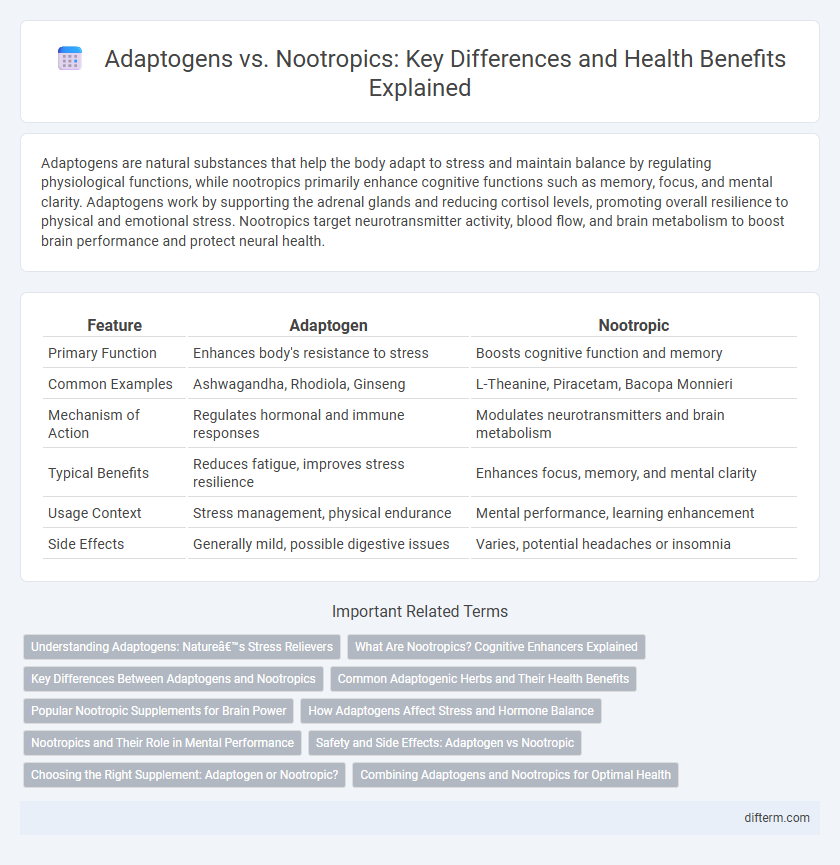Adaptogens are natural substances that help the body adapt to stress and maintain balance by regulating physiological functions, while nootropics primarily enhance cognitive functions such as memory, focus, and mental clarity. Adaptogens work by supporting the adrenal glands and reducing cortisol levels, promoting overall resilience to physical and emotional stress. Nootropics target neurotransmitter activity, blood flow, and brain metabolism to boost brain performance and protect neural health.
Table of Comparison
| Feature | Adaptogen | Nootropic |
|---|---|---|
| Primary Function | Enhances body's resistance to stress | Boosts cognitive function and memory |
| Common Examples | Ashwagandha, Rhodiola, Ginseng | L-Theanine, Piracetam, Bacopa Monnieri |
| Mechanism of Action | Regulates hormonal and immune responses | Modulates neurotransmitters and brain metabolism |
| Typical Benefits | Reduces fatigue, improves stress resilience | Enhances focus, memory, and mental clarity |
| Usage Context | Stress management, physical endurance | Mental performance, learning enhancement |
| Side Effects | Generally mild, possible digestive issues | Varies, potential headaches or insomnia |
Understanding Adaptogens: Nature’s Stress Relievers
Adaptogens are natural substances that help the body resist physical, chemical, and biological stressors by regulating the hypothalamic-pituitary-adrenal (HPA) axis and balancing cortisol levels. Key adaptogens like Rhodiola rosea, Ashwagandha, and holy basil have been shown to enhance stress resilience, improve energy metabolism, and support immune function. Unlike nootropics that primarily boost cognitive performance, adaptogens provide holistic stress relief, promoting overall homeostasis and adaptive responses to chronic stress.
What Are Nootropics? Cognitive Enhancers Explained
Nootropics are substances that enhance cognitive functions such as memory, focus, creativity, and motivation by optimizing brain chemistry and neural pathways. Common nootropics include natural ingredients like Bacopa Monnieri and synthetic compounds like Piracetam, designed to improve mental performance in healthy individuals. Unlike adaptogens that primarily reduce stress and balance the body's response, nootropics specifically target brain function for cognitive enhancement and neuroprotection.
Key Differences Between Adaptogens and Nootropics
Adaptogens are natural substances that help the body resist stress and promote overall balance by regulating hormonal and immune responses, whereas nootropics primarily enhance cognitive functions such as memory, focus, and mental clarity. While adaptogens like ashwagandha and rhodiola support long-term stress adaptation and vitality, nootropics like racetams and modafinil target neurotransmitter pathways to boost brain performance. The key difference lies in adaptogens' systemic stress resilience versus nootropics' targeted cognitive enhancement.
Common Adaptogenic Herbs and Their Health Benefits
Common adaptogenic herbs such as Ashwagandha, Rhodiola Rosea, and Holy Basil help reduce stress, enhance mental clarity, and support hormonal balance by modulating the body's stress response. These natural herbs boost energy levels, improve cognitive function, and promote overall well-being without the risk of dependency associated with some pharmaceutical nootropics. Daily use of adaptogens can improve resilience to physical and mental fatigue, supporting long-term health and vitality.
Popular Nootropic Supplements for Brain Power
Popular nootropic supplements for brain power commonly include compounds like Alpha-GPC, L-Theanine, Bacopa Monnieri, and Rhodiola Rosea. These substances are known to enhance cognitive functions such as memory, focus, and mental clarity by modulating neurotransmitters and reducing mental fatigue. Unlike adaptogens, which primarily help the body resist stress, nootropics specifically target brain performance and neuroplasticity for improved mental output.
How Adaptogens Affect Stress and Hormone Balance
Adaptogens regulate the body's stress response by modulating cortisol levels, supporting adrenal gland function, and promoting hormonal equilibrium. These natural compounds enhance resilience to physical and mental stress, improving overall well-being and reducing fatigue. Key adaptogens like Ashwagandha and Rhodiola Rosea influence the hypothalamic-pituitary-adrenal (HPA) axis, balancing stress hormones effectively.
Nootropics and Their Role in Mental Performance
Nootropics are cognitive enhancers that improve mental functions such as memory, focus, and creativity by modulating neurotransmitter systems and increasing cerebral blood flow. Unlike adaptogens, which primarily help the body resist stress and maintain balance, nootropics target specific neural pathways to boost cognitive performance and neuroplasticity. Clinical studies highlight compounds like piracetam, L-theanine, and modafinil for their efficacy in enhancing executive functions and attention under demanding conditions.
Safety and Side Effects: Adaptogen vs Nootropic
Adaptogens like ashwagandha and rhodiola generally exhibit a favorable safety profile with minimal side effects, primarily mild digestive upset or drowsiness. Nootropics, such as racetams and modafinil, may pose a higher risk of adverse effects including insomnia, headaches, and potential dependency, especially at higher doses or with prolonged use. Careful evaluation of individual health conditions and consultation with healthcare professionals is essential to mitigate risks associated with both adaptogens and nootropics.
Choosing the Right Supplement: Adaptogen or Nootropic?
Choosing between adaptogens and nootropics depends on your specific health goals; adaptogens primarily support stress resilience and hormonal balance, while nootropics enhance cognitive functions like memory, focus, and mental clarity. Key adaptogens include ashwagandha, rhodiola, and holy basil, known for reducing cortisol and improving energy under stress, whereas popular nootropics such as Bacopa monnieri, lion's mane mushroom, and caffeine target brain performance and neuroprotection. Evaluating your needs for anxiety reduction versus cognitive enhancement, alongside potential interactions and clinical evidence, guides the selection of an effective supplement tailored to your wellness plan.
Combining Adaptogens and Nootropics for Optimal Health
Combining adaptogens and nootropics can synergistically enhance cognitive function and stress resilience by balancing the body's response to physical and mental stressors. Adaptogens like Rhodiola Rosea and Ashwagandha support adrenal health and reduce cortisol levels, while nootropics such as Lion's Mane and Bacopa Monnieri facilitate neuroplasticity and memory improvement. This integrative approach promotes sustained energy, mental clarity, and overall well-being by targeting both physiological stress adaptation and cognitive enhancement.
Adaptogen vs Nootropic Infographic

 difterm.com
difterm.com